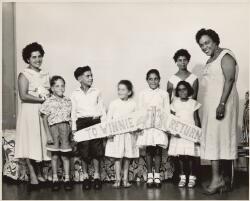November 11th: Today's Feature - Winifred Atwell Pt II
- webbworks333
- Nov 11, 2025
- 4 min read
November
Winifred Atwell: Part II
Life in Australia
In 1955, Atwell arrived in Australia and was greeted as an international celebrity. Her tour broke box-office records on the Tivoli circuit, bringing in receipts of £600,000. She was paid AUS$5,000 a week (the equivalent of around $50,000 today), making her the highest-paid star from a Commonwealth country to visit Australia up to that time.
She toured Australia many times and made Australian guitarist, Jimmy Doyle, her musical director in the 1960s. In 1962, she made a nationwide tour of Britain, with "The Winifred Atwell Show", accompanied by the Cy Bevan Group, who were with her then current radio series "Pianorama".
Her popularity in Australia led to her settling in Sydney in the 1970s, and she became an Australian citizen two years before her death.
Keith Emerson noted her influence on his playing in an interview: "I've always been into ragtime. In England—and I'm sure Rick Wakeman would concur—we loved Winifred Atwell, a fantastic honky-tonk and ragtime player.”
Atwell was also a skilled interpreter of classical music. On 1 and 2 December 1954, at London's Kingsway Hall, with the London Philharmonic Orchestra conducted by Stanford Robinson, she made one of the first stereo classical recordings in the UK of a major repertoire work, the Piano Concerto in A minor, Op. 16, by Grieg. The two-channel version, engineered by Decca's Roy Wallace, appears not to have been released, but a transfer of the Decca LP (mono) LF1206 has been produced and issued by Pristine Audio as an available download. Another Decca recording by Atwell is George Gershwin's Rhapsody in Blue with Ted Heath's band, which contained an arrangement in the Glenn Miller style of the slow section.
Later life
Atwell bought an apartment on the beach front in Flight Deck, an apartment complex in Collaroy in Sydney, as a jumping-off base for her worldwide performance commitments. She was a member of the Moby Dick Surf Club at Whale Beach where she performed regularly in support of the surf club. Enjoying the affection of the public, she was nevertheless keenly aware of prejudice and injustice and was outspoken about racism in Australia.
She always donated her services in a charity concert on Sundays, the proceeds going to orphanages and needy children. She spoke out against the Third World conditions endured by Aboriginal Australians, which made headlines during an outback tour of the country in 1962.
Dismissing racism as a factor in her own life, she said she felt she was "spoiled very much by the public". She left her estate to the Australian Guide Dogs for the Blind and a small amount to her goddaughter. However, a cousin of Lew Levisohn contested Atwell's will and is reported to have been granted $30,000 from her estate.
Atwell also created headlines in the 1960s with her dieting, slimming from 16 to 12 stone (102 to 76 kg), using what would today be called a protein diet.
Winifred Atwell with her mother & TV host
In 1978, she appeared on Australian TV's This Is Your Life. At the end of the show, she played a few bars of "Black and White Rag" using her "other" piano, which had been in retirement for many years.
Though a dynamic stage personality, Atwell was modest, shy and soft-spoken. Eloquent and intellectual, she was well read and keenly interested in and informed about issues and current events. Voracious in her reading habits and a devotee of crosswords, she confessed to an inordinate love of mangoes, a dislike of new shoes, and a keen interest in televised cricket (she backed England).
She was also a devout Catholic, who unpretentiously played the organ for her parish church.

Atwell often returned to her native Trinidad and, on one occasion, she bought a house in Saint Augustine, which she adored and later renamed Winvilla. It was later turned into the Pan Pipers Music School by one of her students, Louise McIntosh.
In 1968, Atwell recorded Ivory and Steel, an album of standards and classics, with the Pan Am Jet North Stars Steel Orchestra (director/arranger Anthony Williams), and supported musical scholarships in the West Indies. In the early 1980s, her sense of loss following her husband's death made her consider returning to Trinidad to live, but she found the weather too hot.
Atwell suffered a stroke in 1980. In 1981, she officially retired on The Mike Walsh Show, then Australia's highest-rating television variety programme. She categorically stated that she would retire and not return as a public performer, and that she had had an excellent career.
Her last TV performance was "Choo Choo Samba", followed by a medley of "Black and White Rag" and "Twelfth Street Rag". Her only non-private performances from that point were as an organist in her parish church at Narrabeen.
Death
In 1983, following an electrical fire that destroyed her Narrabeen home, she suffered a heart attack and died while staying with friends in Seaforth. She is buried beside husband, Lew Levisohn, in Northern Rivers Memorial Park, South Gundurimba in northern New South Wales, just outside Lismore.
Awards
In 1969, she was awarded Trinidad and Tobago's national award, the Gold Hummingbird Medal, for her achievements in music.
Legacy
On 2 December 1956 a track by Winifred Atwell became the first ever by a black person to go to number one in the UK singles chart.
She’s still the only female instrumentalist to achieve the coveted top spot selling over 20 million records and counting Elton John as one of her fans, yet she has largely been forgotten.
Elton John called Atwell one of his musical heroes. Elton paid for Winifred's piano shaped headstone.

In November 2020, Nubian Jak Community Trust black plaque honouring Atwell was unveiled at the former site of a hair salon she owned in Chaucer Road, Brixton, South London.




















